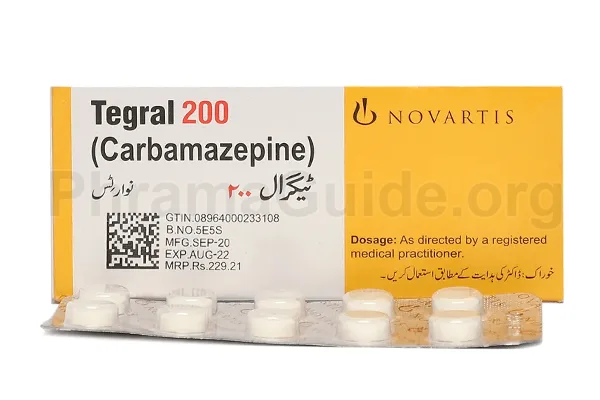Tegral is an anticonvulsant and mood-stabilizing medication used primarily to treat epilepsy, bipolar disorder, and trigeminal neuralgia. It can have various side effects, and not everyone experiences them. Here are some common and less common side effects of Tegral.
Common Side Effects
- Dizziness or drowsiness: These are among the most commonly reported side effects of Tegral. It can cause feelings of lightheadedness, dizziness, or increased drowsiness, affecting coordination and the ability to perform tasks that require alertness.
- Nausea and vomiting: Gastrointestinal upset is another common side effect. Individuals might experience nausea, sometimes leading to vomiting, especially when first starting the medication.
- Headache: Some people might experience headaches or migraines as a side effect of Tegral.
- Fatigue: Feeling tired or experiencing fatigue is relatively common with this medication, particularly during the initial phase of treatment or when dosage is increased.
- Blurred or double vision: Tegral can cause visual disturbances, including blurred or double vision. This side effect might be transient or improve over time.
- Skin rash: Skin reactions, such as rashes, might occur, ranging from mild to severe. Severe skin reactions, such as Stevens-Johnson syndrome or toxic epidermal necrolysis, though rare, are serious and require immediate medical attention.
- Unsteadiness or lack of coordination: Some individuals may experience a lack of coordination or unsteadiness when walking or performing tasks requiring balance.
- Memory and concentration difficulties: Tegral might affect cognitive function, leading to issues with memory, attention, or concentration.
- Changes in blood cell count: It can cause changes in blood cell counts, including a decrease in white blood cells (leukopenia), red blood cells (anemia), or platelets (thrombocytopenia). Regular blood tests might be necessary to monitor these levels.
- Mood changes: In some cases, Tegral might cause mood changes, leading to irritability, agitation, or depression.
- Weight changes: It can cause weight gain or weight loss in some individuals.
- Liver function changes: Rarely, Tegral might affect liver function, leading to abnormal liver enzyme levels or, in rare cases, liver damage.
Less Common Side Effects
- Hyponatremia: Tegral can sometimes lead to low sodium levels in the blood, especially in older adults, causing symptoms like weakness, confusion, headache, and, in severe cases, seizures or coma.
- Allergic reactions: Rarely, Tegral can cause severe allergic reactions, such as skin rash, itching, hives, swelling of the face, lips, tongue, or throat, and difficulty breathing. Immediate medical attention is necessary if these symptoms occur.
- Agranulocytosis: In rare cases, Tegral can cause a severe drop in white blood cell count, leading to agranulocytosis. This condition increases the risk of serious infections and requires immediate medical attention.
- Serious skin reactions: Severe skin reactions, such as Stevens-Johnson syndrome or toxic epidermal necrolysis, though rare, can occur with Tegral. These reactions present with widespread rash, blisters, and peeling of the skin and require immediate medical intervention.
- Cardiovascular effects: Rarely, Tegral might lead to cardiovascular side effects, including arrhythmias (irregular heartbeats) or heart block.
- Pancreatitis: In rare instances, Tegral might cause inflammation of the pancreas (pancreatitis), leading to abdominal pain, nausea, and vomiting.
- Hepatitis: Tegral can, in rare cases, cause liver inflammation (hepatitis), leading to symptoms like jaundice (yellowing of the skin or eyes), abdominal pain, and fatigue.
- Increased intraocular pressure: There have been reports of Tegral causing increased pressure in the eyes, which might be problematic for individuals with glaucoma.
- Endocrine disturbances: Tegral might rarely affect hormone levels, leading to disturbances in hormonal balance.
- Bone marrow suppression: In very rare cases, Tegral might lead to bone marrow suppression, resulting in decreased production of blood cells.

What is Tegral?
Tegral is one of the leading brands of Carbamazepine, manufactured and marketed by Novartis Pharma (Pakistan).
Tegral : Available Formulations and Strengths
Presently, Tegral is available in Tablet and Suspension form with the following strengths.
Tegral Tablet : 200mg strength.
Tegral Suspension : 100mg/5ml strength.
What Are The Possible Drug Interactions of Tegral?
- Antidepressants: Tegral might decrease the effectiveness of certain antidepressants, such as selective serotonin reuptake inhibitors (SSRIs) like fluoxetine, sertraline, or tricyclic antidepressants.
- Antipsychotics: Interaction with antipsychotic medications like haloperidol or clozapine might reduce their effectiveness.
- Other antiepileptic drugs: Tegral can interact with other antiepileptic medications like valproic acid, phenytoin, phenobarbital, and lamotrigine, affecting their blood levels and potentially leading to either decreased effectiveness or increased side effects.
- Oral contraceptives: Tegral might reduce the effectiveness of oral contraceptives, increasing the risk of unintended pregnancy. Additional contraceptive methods or alternative birth control options may be necessary.
- Anticoagulants: Tegral can reduce the effectiveness of anticoagulants like warfarin, potentially increasing the risk of blood clotting or bleeding episodes.
- Antibiotics: Certain antibiotics, such as erythromycin, clarithromycin, and azithromycin, might increase Tegral levels in the blood, leading to an increased risk of side effects.
- Calcium channel blockers: Drugs like verapamil and diltiazem might interact with Tegral, leading to increased or decreased blood levels of either drug, potentially causing side effects or reducing effectiveness.
- Corticosteroids: Tegral can decrease the blood levels and effectiveness of corticosteroids like prednisolone or dexamethasone.
- HIV medications: Protease inhibitors used to treat HIV, such as ritonavir or lopinavir, might interact with Tegral, affecting blood levels and potentially leading to reduced efficacy or increased side effects.
- Mood stabilizers: Lithium and Tegral used together may increase the risk of neurotoxicity.
- Grapefruit juice: Consuming grapefruit juice while taking Tegral can increase its blood levels, leading to an increased risk of side effects.

Leave A Comment